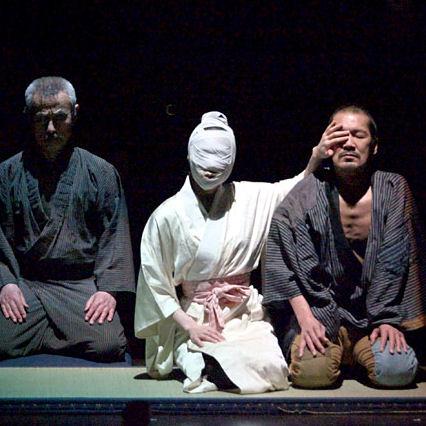“Those who seem to me to be the most happy, contented and fulfilled,” opined the Queen in her 2008 Christmas message, “live the most unselfish lives.” Some of Her Majesty’s subjects might think that homily sounds a bit rich coming from the wealthiest woman in the world (if you count the art collection). Happiness in the UK tends to be more associated with getting than giving – hence the gloom now the money’s run out.
Shun-Kin, Simon McBurney’s latest show for Complicite at the Barbican, is the Japanese story of servant Sasuke’s masochistic love for his beautiful, blind mistress the music teacher Shun-Kin. Sasuke takes his devotion so far that he eventually blinds himself, claiming to be at his happiest after his sight has gone. Suffering, even dying, for love is by no means unusual on the page or stage; it’s the passive way in which Sasuke endures years of violent humiliation from his beloved that sits uncomfortably with a Western audience more accustomed to sword fights than self-abasement.
The staging is of the high standard that is Complicite’s trademark. The puppet work is particularly impressive and the simplicity of set and props is beautiful in itself. Light and shadow are expertly blended with a soundscape containing both live and recorded music and the whole is overlaid with projected images that contribute to rather than intrude on the narrative .
The prominence of the central relationship between Sasuke and Shun-Kin makes it easy to overlook the simple framing device through which their story is presented. A diffident actress arrives in an empty recording studio to do a voiceover. The job is to narrate the life of Shun-Kin for a TV production. As her day wears on, the actress is persuaded to think again about a relationship in trouble and her final phone call (of which only her side is heard) gives the piece its happy ending. The Queen would be delighted.
Shun-kin
Complicite / Simon McBurney
30 January 2009 – 21 February 2009 / 19:45, 14:30
Barbican Theatre





